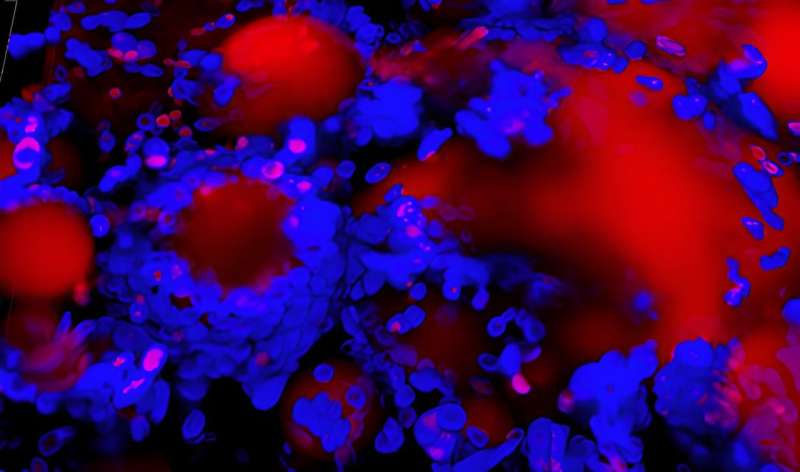This article has been reviewed according to Science X's editorial process and policies. Editors have highlighted the following attributes while ensuring the content's credibility:
fact-checked
trusted source
proofread
Yeast uses plastic waste oils to make high-value chemicals

Polyolefins are a type of plastic that is resistant to breaking down. This makes this plastic—a kind found in everything from grocery bags to car bumpers—hard to recycle. In a new study, scientists have discovered a potential solution, the yeast Yarrowia lipolytica.
The study found that the yeast can use hydrocarbons from polyolefin plastic wastes to grow its own cells. It does so by shifting its production of protein toward energy and lipid metabolism to grow on hydrocarbons. It can also produce citric acid and neutral lipids that can be used to make biodegradable polyesters and polyurethanes.
The paper is published in the journal mSystems.
Plastic wastes such as polyolefins are challenges for biological upcycling. This is the set of processes that use naturally occurring options such as microbes to break down and reuse plastics. This study discovered yeasts that can function as microbial catalysts for plastics. This would make yeasts a promising choice for sustainable processes for the biological upcycling of plastic waste. The findings are a step toward decarbonization and reducing environmental pollution due to plastic consumption, incineration, and landfill storage.
The world needs sustainable processes for biological upcycling of plastic wastes in a circular bioeconomy to promote decarbonization and reduce environmental pollution due to plastic consumption, incineration, and landfill storage. This research used strain characterization and proteomic analysis to reveal the robust metabolic capabilities of Y. lipolytica for upcycling polyethylene into high-value chemicals.
When growing on hydrocarbons, Y. lipolytica partitioned into planktonic and oil-bound cells, each exhibiting distinct proteomes and amino acid distributions invested into establishing these proteomes. Y. lipolytica required significant proteome reallocation towards energy and lipid metabolisms for robust growth on hydrocarbons with n-hexadecane as the preferential substrate.
This growth included expression and upregulation of many associated proteins and pathways including the hydrocarbon degradation pathway, Krebs cycle, glyoxylate shunt, and unexpectedly, propionate metabolism. However, an apparent over-investment in these same categories to utilize complex depolymerized plastics oil came at the expense of protein biosynthesis, limiting cell growth.
Overall, this study elucidates how Y. lipolytica activates its metabolism to utilize depolymerized plastics oil and establishes Y. lipolytica as a promising host for the upcycling of plastic wastes.
More information: Caleb Walker et al, Proteomes reveal metabolic capabilities of Yarrowia lipolytica for biological upcycling of polyethylene into high-value chemicals, mSystems (2023). DOI: 10.1128/msystems.00741-23
Provided by US Department of Energy





















